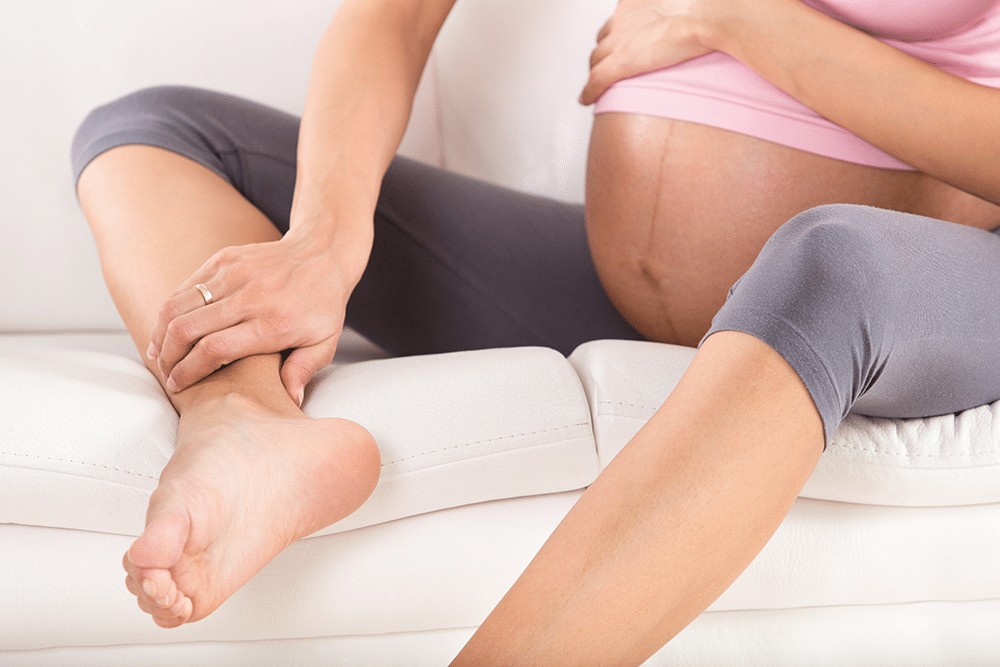Veins perform a tremendously important role in the human body but unless you have a history of venous disease in your family tree, it’s likely that they aren’t often thought about until a problem arises. Veins create a circulatory network in the body, working hard to move blood back and forth between extremities and the heart. A collection of valves within the veins keeps blood flowing in the right direction but in the event that one or more of these valves malfunction, trouble can follow.
A faulty venous valve will allow blood to flow in the opposite direction and as it follows gravity, blood begins to pool most often in the extremities with no way to return to the heart. In this scenario, the pressure of pooling blood begins to strain the walls of the veins which can lead to bulging, and discoloration over time through visible veins during pregnancy.

When this condition becomes visible at the surface of the skin, it’s referred to as varicose veins. While varicose veins can be frustrating to patients aesthetically, more often than not the bigger issue lies with their painful associated symptoms. Many patients suffering from this condition experience swelling, skin that’s painful and warm to the touch and legs that feel heavy, achy, itchy or restless.
Potential Causes for Varicose Veins During Pregnancy
Physicians generally point to a number of potential causes when it comes to why some individuals develop varicose veins. While genetics play a major role in the development of varicose veins, individuals that perform work that requires extended periods of sitting or standing are also at a higher risk of developing the condition. Additionally, those who smoke, adhere to a lifestyle with unhealthy eating habits, or don’t participate in regular exercise are more likely to develop varicose veins. Women in their second trimester of pregnancy are also highly prone to developing varicose veins during a time when the hormone progesterone is high and weight fluctuations and fluid retention are as well.
How Pregnancy Is Linked to Varicose Veins
During pregnancy, a woman’s blood pressure naturally rises in preparation for birth and in an effort to not only circulate blood through her body but provide for the baby as well. In some cases, this increased pressure causes stress on the veins causing valves to malfunction. Increased weight and fluid retention can make it even more difficult for veins to transport blood back to the heart. The combination can quickly lead to the development of varicose veins which often appear on the legs or thighs but can also potentially develop around the vagina or vulva. While visible veins during pregnancy may increase in severity, many women notice a change after giving birth. However, it’s highly unlikely that varicose veins will disappear completely on their own once they’ve developed.
Diagnosing and Treating Varicose Veins
While varicose veins are left to their own devices during pregnancy, post-pregnancy options are similar to any patient that suffers from varicose veins. A physical examination is generally performed to evaluate the severity of the varicose veins and an ultrasound is used to establish the areas where valves may be the most problematic. Those patients that are presenting with more mild cases of varicose veins may be recommended to wear compression garments to both keep swelling at a minimum in the extremities and promote healthy blood flow throughout the body once more. Compression garments range from socks to sleeves and when used in combination with a healthy diet and plenty of exercise, can prove highly effective at treating the appearance of mild varicose veins over the long-term.
Those patients who have developed more severe cases of varicose veins during pregnancy may need to consider minimally invasive treatment options that are used to target the problem at the source. Laser ablation and sclerotherapy are both valid options for patients looking to reduce or eliminate varicose veins after pregnancy. Both options provide a route to collapsing problematic veins using a technique that can be performed in an outpatient setting and comes with a rather short and painless recovery period. Advancements in technology mean that women looking to treat varicose veins after pregnancy no longer need to exclusively consider options such as painful vein stripping and can instead enjoy a variety of choices that keep pain and risk to a minimum when dealing with the management of varicose veins during pregnancy.
The team at the St. Louis Laser Vein Center is happy to help provide in-clinic options for payment plans and financing.
Schedule a Consultation Today
Vein health is important to overall health and at the St. Louis Laser Vein Center, we take a comprehensive and customized approach to treating our patients. When you’re considering varicose vein treatment, be sure to schedule an initial consultation with Dr. Wright. Contact us today to learn more about the many treatment options available.
